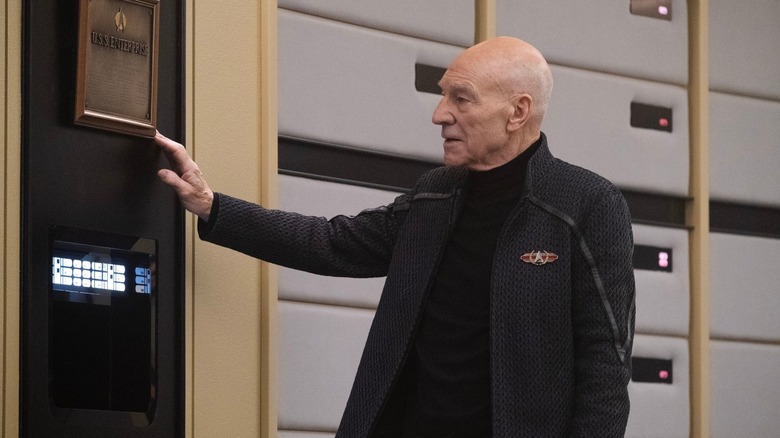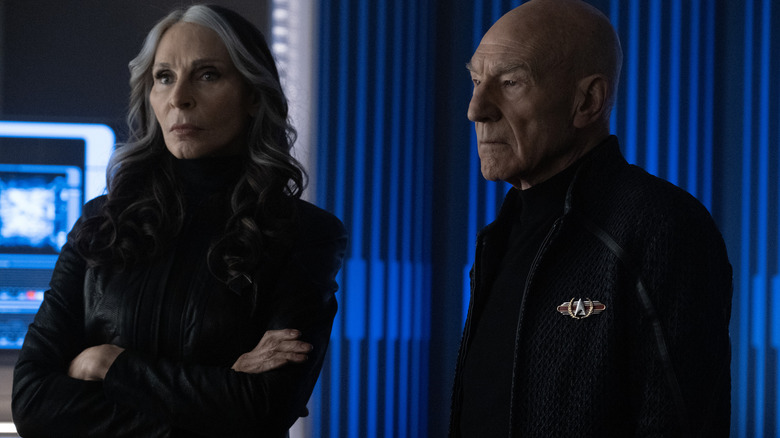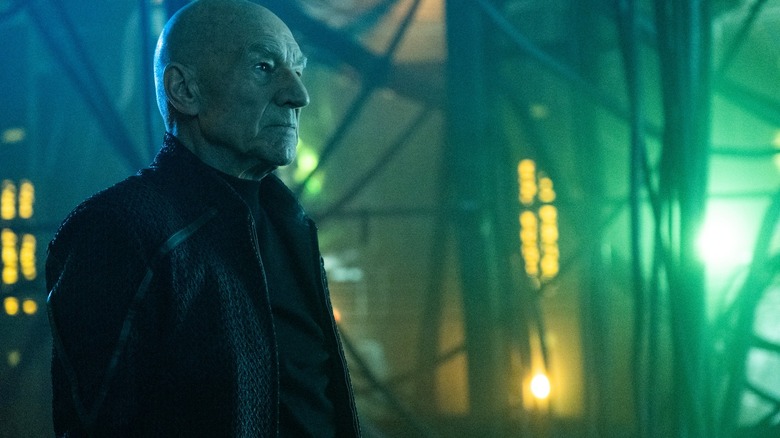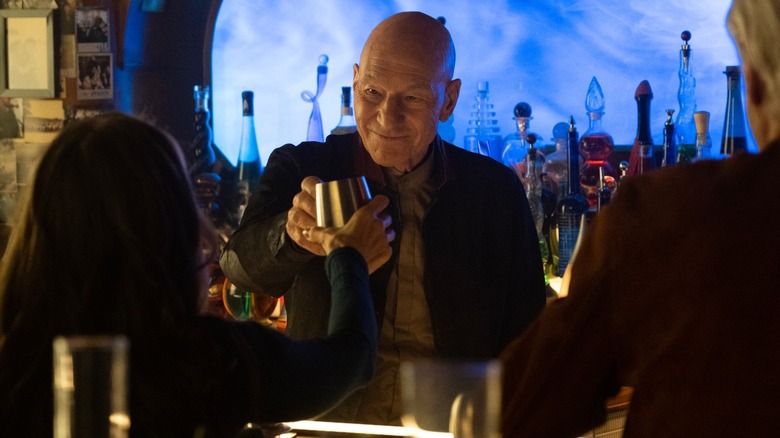Patrick Stewart Had Three Rules For Star Trek: Picard – And They Broke One Of Them
Patrick Stewart was finished playing Captain Picard. The acclaimed actor had already played the character in 176 episodes of "Star Trek: The Next Generation," in one episode of "Star Trek: Deep Space Nine," and in four feature films, all between 1987 and 2002. Stewart hung up his uniform and was eager to take on other acting challenges. Indeed, the 2002 film "Star Trek: Nemesis" was a notorious bomb, and the last remaining series, "Star Trek: Enterprise" struggled through its final years before being canceled in 2005. For all intents and purposes, "Star Trek" was at an end, and Stewart could, if he so desired, merely reminisce at "Trek" conventions and stay in contact with the old castmates in his contacts folder.
When CBS All Access launched in 2017, however, Paramount became intensely keen on putting multiple new "Star Trek" shows into production. The streaming service, now called Paramount+, launched with "Star Trek: Discovery," a show set about a decade before the events of the original "Star Trek." The time came, it seems, to tap into some "Next Generation" nostalgia as well, and the new "Trek" honchos Akiva Goldsman and Alex Kurtzman approached Stewart about a new series called "Star Trek: Picard," a show to be set several decades after "Nemesis" that would catch up with the character in his old age.
Stewart's initial reaction? Hard pass. He had no interest. In his new autobiography "Making It So: A Memoir," Stewart recalls his need to explain his refusal to the Paramount executives and the hard sell they still gave him, even after his refusal. After being worn down, Stewart agreed to make another "Trek" series under three conditions.
The execs abided by two of them.
I was done with him
Over a coffee table in Bel Air, California, Patrick Stewart told the Paramount showrunners, in no uncertain terms, that he refused to play Jean-Luc Picard again, and why, saying:
"I made it clear to my lunch hosts that I was proud of the work we had done on 'The Next Generation' and the four feature films that followed. I had very much enjoyed being Jean-Luc and kept him close in my heart. But. I was done with him. I had said everything I wanted to say about him. His journey, as far as I was concerned, was complete, and for the remainder of my life, I was eager to find work as far away from 'Star Trek' as possible, to keep moving forward as an actor. I thanked Alex, Kirsten, and James for their time and interest, but that was that."
Alex was Kurtzman, Kirsten was Kirsten Bayer, an author of "Star Trek" novels, and James was screenwriter James Duff. Stewart knew going into the room, however, that the writers would pitch him ideas regardless of his refusal and steeled himself for their barrage of seductive offers and story ideas. They argued that Jean-Luc's story is definitely not over and that catching up with the character in his 90s and 100s might provide intriguing new wrinkles. Did he retire? When? And for what reason? Etc. etc.
After receiving a 10-page memo full of ideas, Stewart began to consider the burdens of returning to Los Angeles and shooting more "Star Trek." He still wasn't wholly convinced, but his pondering of logistics meant he was beginning to give "Star Trek: Picard" some serious thought. Eventually, he would return to the Bel Air coffee table with an ultimatum.
The three rules
Patrick Stewart said that he would return to Jean-Luc Picard under three conditions:
"1. The series would not be based on a reunion of 'The Next Generation' characters. I wanted it to have little or nothing to do with them. This was not at all a mark of disrespect for my beloved fellow actors. Rather, I simply felt it was essential to place Picard in entirely new settings with entirely new characters. Perhaps Picard might encounter Riker or Dr. Crusher in the second season, but such encounters were not to be the series' raison d'être."
Nostalgia is out, no legacy, no notable reunions. Got it. What else?
"2. Picard would no longer be serving in Starfleet, and he was not to wear any kind of uniform or badges. 3. The series would run for no more than three seasons. It was clear to me that the writing team was not entirely thrilled with these conditions, but basically, they were all agreed to. The no-uniform rule was the toughest one for them to stomach, for some reason, and more than once, I was asked to reconsider my hard line. I stuck to my guns."
The writers were largely accommodating. In "Picard," Jean-Luc is a retired admiral who lives as a civilian on his vineyard in the French countryside. When the first season's adventures began, it was with outsiders and rogue Starfleet personnel who were not assigned to sanctioned starships. They became a ragtag group of friends solving a riddle outside of Starfleet's purview. Picard wears a visitor's badge but is never in uniform. Riker (Jonathan Frakes), Troi (Marina Sirtis), and Data (Brent Spiner) have cameo roles, but the story isn't about them.
By season 3, the first rule would be spectacularly violated.
Nostalgia after all
One only needs to watch the advertising bumpers for "Star Trek: Picard" season 3 to see that Paramount convinced Patrick Stewart to abandon the "no reunion" rule. The raison d'être of the show did indeed become about reuniting seven of the main cast members of "Star Trek: The Next Generation." Stewart recalls his change of heart, saying:
"For Season Three, our last, Terry Matalas, by then 'Picard's' showrunner, told me that the studio wanted a full 'Next Generation' reunion. Ugh, just what I had firmly said I didn't want. But that had been three years ago. Now I was less resistant, having enjoyed working with Jonathan, Brent, Marina, John [De Lancie], and Whoopi [Goldberg]. As an executive producer, I had a say in how we might go about achieving such a reunion. I told Terry, 'I like the idea, provided that we don't bring them all back at once. Let's trickle them back in.'"
And so they did. Indeed, for a show that was initially resistant to nostalgia, and a series that began with Picard saying he wasn't interested in notions of legacy, the third season of "Picard" leaned into both concepts almost intolerably hard. "Picard" ended with all seven "Next Generation" cast members on board the bridge of a reconstructed Enterprise-D, firing phasers at a Borg ship. The epilogue saw the launch of the Enterprise-G. Terry Matalas, meanwhile, has expressed interest in making a "Picard" spinoff show called "Star Trek: Legacy."
Despite Stewart's initial prime directive of fighting nostalgia, "Picard" became the opposite. It was, however, mercifully tasteful (the Enterprise-D stuff notwithstanding). "Picard" celebrated the character's legacy after all.



